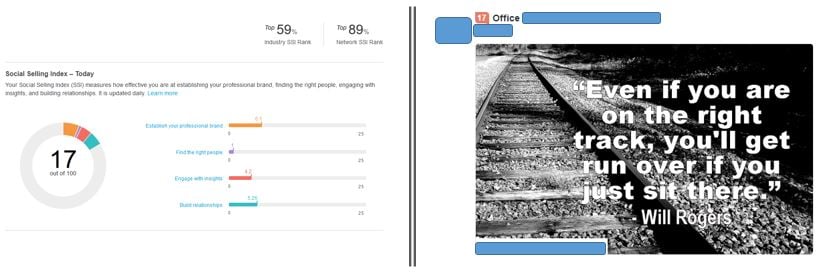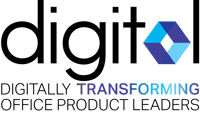In this, the sixth of a seven-part series of articles, I'm going to explain the concept of social authority as it may relate to office products resellers in the United States. Many may wonder why it is that I believe the need to establish social authority has become such an important component of the increasingly digital environment we operate in.
Most independent office products resellers lack a social strategy and appear skeptical of the role of social platforms in business. Perhaps this is partly so as a result of the highly visible use of social media by celebrities as part of their, very different, business models.
For those reluctant to participate on appropriate social platforms, whether they like it or not, the clock is not likely to be turned back. Social media is here to stay and it will have an increasingly important role to play in the functioning of modern business.
The Series Index & Links to Access
- Part I - Domain Age and Authority
- Part II - Website Grade
- Part III - Backlinks
- Part IV - Traffic Ranking
- Part V - Social Shares
- Part VI - Social Authority
- Part VII - Conclusions
I'll be publishing the concluding part to this series within the next few days as I complete the additional support promised for the argument I presented in my December 20, 2016, article, "How the Office Products Industry has Failed the Resellers".
Merriam-Webster's definitions of authority:
-
The confident quality of someone who knows a lot about something or who is respected or obeyed by other people.
-
The power to influence or command thought, opinion, or behavior.
Both these definitions are relevant to the theme of this article but, particularly the second one, as it strikes directly at the heart of where we aim. Remember, content, content, content is our King because, high-quality content is the platform from which an author is able to demonstrate his or her command over a subject matter.
"By demonstrating knowledge via content, then the power to influence thought, opinion or behavior can be established".
Remember, over 90% of buyer's research online before they make a buying decision. If a business, such as an office products reseller, wants to be a beneficiary of this research then they must publish high-quality content, content which has been developed specifically for that purpose.
"Ultimately, why would a buyer make a decision to buy anything from a company or individual that's unable to demonstrate it knows what it's talking about?"
In order for content to rank well in searches, it must be accurately targeted at the researchers, it must be placed on a website that's built and designed to perform well in today's online environment and, it must be placed on a site that's viewed by the search engines as trustworthy. In fact, the website must possess all the attributes we've been advocating in this current series.
Measuring Social Authority:
"Trust grows by being able to view a person's social content in aggregate!"
How do you measure the power to influence or command thought, opinion or behavior and why is it important to be able to see the results of such measurements?
The volume of content being posted on the internet is staggering and continues to accelerate. Everyone's time is valuable and, with over 4,000,000 search inquiries on Google every minute of every single day, how on earth can a researcher know whether or not to trust the information accessed from a search inquiry? Multiple searches and manual validation is one way, but another, perhaps more efficient, can be through the use of platforms set up for the purposes of measuring the online authority of content creators.
There are two popular, easily accessible platforms widely used to measure levels of online influence or authority which award scores on a scale of one to one-hundred as indicators of influence or authority.
- Klout Score
- LinkedIn Social Selling Index (SSI) Score
Of the two examples shown in the images below, who would you instinctively be inclined to trust more?
Example # 1

Example # 2

My LinkedIn SSI, as of the date of this publication, is 67 and my Klout 47, which compares to the SSI of 17 and Klout of 17, of a relevant individual and company I randomly selected out of the office products and supplies industry. You may or may not like my content, or agree with my views but, that's not the point here. Instead, it's simply to demonstrate that one set of index scores are higher than the other which may, in turn, be interpreted by a reader that the content may be treated with a higher level of trust and authority.
Ultimately, the higher your scores, the more views, shares, likes, etc. that are likely to be generated from your content which, in turn, translate into still higher levels of influence and authority.
As we've learned from Part V in this series, where I dealt with the topic of Social Shares and Social Currency, the larger the audience and the larger the numbers of shares and likes, then the greater the value of the accumulated social currency. Accumulated social currency translates into brand equity.
The role of paid advertising:
As I've written many times, developing relevant website traffic is hard work, it takes time, and there are no effective shortcuts that I know of. The process I've been explaining and advocating for is lengthy, it's laborious and, not many have the fortitude to independently stick with it. At some point, those who do, may look to accelerate the process which, while possible, must have the fundamentals in place first.
One of the acceleration paths is to pay for content to be placed in front of a larger audience. There are two key words here, firstly, "pay" and secondly "content". Put bluntly, if you don't have high-quality content, then don't pay as you will waste your money. This is what I mean by stating the fundamentals (i.e. content) must be in place first. Once a library of high-quality content has been established, then and only then, may it be time to start considering the potential benefits of reaching an expanded audience through payments to a platform operator such as Facebook, Google, Twitter or LinkedIn, all of whom have very large networks containing potentially relevant audiences.
However, even with paid advertising, it does not obviate the requirement for continuing to build authority as, paid or otherwise, without "authority" no one will listen. Furthermore, if the message is too bluntly focused on sell, sell, sell, then it will fail. Trust must be established first with unique, proprietary content structured to educate, combined with the sharing of relevant, high-quality material authored by others and then, finally, promotion of your own selling collateral. To be most effective, each of the three content components should be in equal proportions to the others.
Learn more about a unique Digital Transformation Service - everything you need for a digital upgrade and the tools needed for developing new business with "Blue Ocean" caliber customers. Just click on the link below.
Conclusions:
It's all about your content, your audience and your engagement with that audience. This, in essence, should make up your marketing and your development of brand equity in the modern digital world.
However, although my emphasis is on digital marketing and the use of information technology, it should not mistakenly thought to be exclusively so.
Focusing 100% of relationship efforts online is likely to prove to be a terrible mistake. As I've written many times, social media is not a "silver-bullet", either-or decision. It can be used to effectively complement (not replace) traditional relationship (face-to-face) selling and marketing strategies. This distinction is also wonderfully explained by Freek Vermeulen in his recent Harvard Business Review article titled "What So Many Strategists Get Wrong About Digital Disruption."
If you missed my recent eight-part series on the office supplies aftermarket tipping point, please check out my new eBook, it's just published, it's FREE, and it contains a thorough examination of the office supplies industry and a path to the $20 billion growth opportunity for independent resellers.









